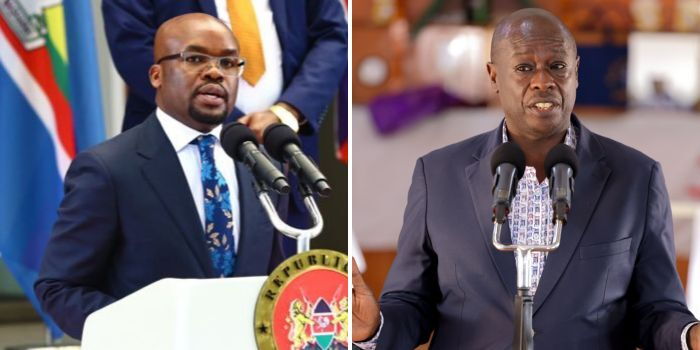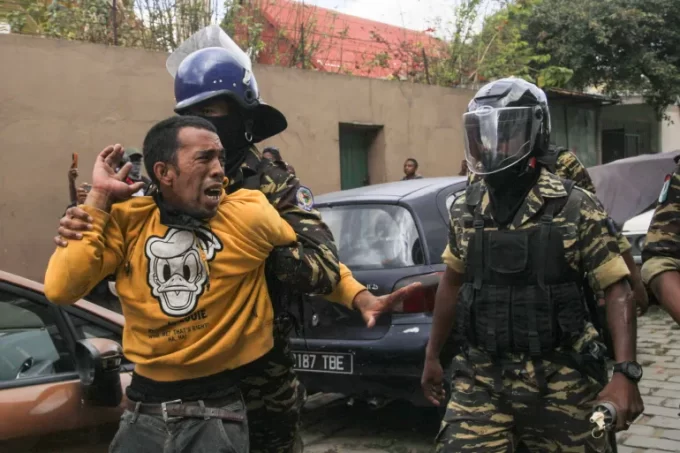Ps Raymond Omollo and former DP Rigathi Gachagua// PHOTO COURTESY.
The exchange between Interior PS Dr. Raymond Omollo and former Deputy President Rigathi Gachagua highlights a crucial issue in Kenyan politics: the intersection of public health crises and political rhetoric. Gachagua’s assertion that the government is targeting Mt. Kenya residents with illicit alcohol is not only inflammatory but also risks undermining efforts to combat substance abuse.
He expressed deep concern outlining that the aim of President William Ruto resurging illicit brews in Mt. Kenya is to reduce voter numbers.
“The population of the Mt Kenya region is now under threat due to alcohol and drug abuse. The government seems intent on facilitating the distribution of harmful substances to weaken our voter numbers ahead of the elections,” started Gachagua yesterday while attending a church service in Naivasha.
Gachagua emphasized that this situation is not just a political issue but a matter of life and death for many families in the region, urging the government to take immediate action to protect the youth from these dangerous substances. His statements suggest a deliberate strategy by the government, which can exacerbate existing tensions, particularly in a country where political narratives often shape public perception and action.
Omollo’s rebuttal on the other hand, emphasizes the government’s commitment to addressing illicit alcohol, stressing that serious allegations should not be trivialized, especially in public forums like church services.
In a statement, the PS termed Gachagua’s sentiments as disingenuous while underlying government’s commitment in fighting the vice.
“It is disingenuous for Mr. Gachagua to make such ludicrous claims after serving this country at the highest office. Substance misuse affects families across all demographics and should not be politicized,” read part of the statement .
Omollo further elaborated that “the government is actively working to combat substance abuse through various initiatives and partnerships aimed at protecting our communities from the dangers of illicit alcohol.” He highlighted ongoing programs designed to educate the public about substance abuse and provide support for those affected, reinforcing that addressing this crisis requires a collaborative approach rather than political finger-pointing.
Omollo also pointed out that “the rise in illicit alcohol consumption has devastating effects on our society, leading to increased crime rates and family breakdowns,” underscoring the urgency of the situation. This sentiment resonates with many Kenyans who are grappling with the harsh realities of addiction within their communities.
Omollo’s remarks underscore the need for a unified approach to tackling substance abuse rather than using it as a political weapon.
Moreover, Gachagua’s call for action must be substantiated with evidence if he genuinely seeks to address the crisis. This situation serves as a reminder that political leaders have a responsibility to prioritize facts over sensationalism, particularly when lives are at stake. The ongoing issue of illicit alcohol consumption in Kenya is not merely a political talking point; it is a public health crisis that requires collaborative efforts from all stakeholders, including government officials, community leaders, and citizens.

The statistics surrounding alcohol consumption in Kenya are alarming. According to recent surveys by the National Authority for the Campaign Against Alcohol and Drug Abuse (NACADA), approximately one in every eight Kenyans aged 15–65 years is currently using alcohol, with an estimated 1.3 million individuals struggling with addiction. This widespread issue has severe implications for families and communities, contributing to domestic violence, neglect of responsibilities, and increased poverty levels. The emotional toll on families affected by alcohol abuse is profound; children often bear the brunt of these challenges, facing instability and trauma that can last a lifetime.
As the festive season approaches, a united front against substance abuse becomes essential for safeguarding families across Kenya. Political leaders should focus on constructive dialogue and solutions rather than engaging in blame games that could further polarize communities. Instead of fostering division through rhetoric, there should be a concerted effort to educate the public about the dangers of illicit alcohol and promote healthier lifestyle choices
In conclusion, it is crucial for politicians to engage responsibly with public health issues. The stakes are high; misinformation and inflammatory rhetoric can lead to increased social unrest and hinder progress in addressing critical health challenges. As Kenya navigates its political landscape, prioritizing public health over political gain will be vital for fostering trust and ensuring the well-being of all citizens.
By working together—politicians, healthcare professionals, and communities—Kenya can create a healthier future for its people, free from the shackles of substance abuse. The human stories behind these statistics remind us that every individual affected by addiction deserves compassion and support rather than being caught in a political crossfire.














